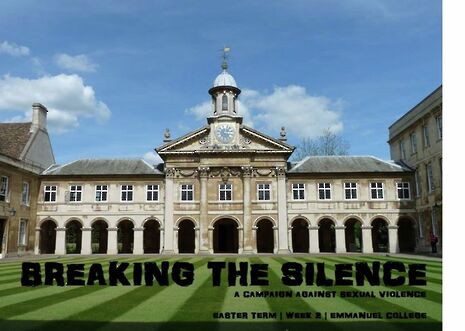Emma says NO to sexual harassment
Survivors of sexual violence speak out in favour of Emmanuel’s new Sexual Harassment policy

Following the recent photo shoot at Emmanuel as part of their campaign to "Break the Silence" around sexual violence, last night the college hosted a speakers event to discuss their new Sexual Harassment policy. The photos – taken in April at the Front Court of the college – were on display as part of the event.
Student sexual assault surviors Francesca Ebel and Anna Walker spoke out about their experiences as part of the movement to ‘Break the Silence’ surrounding sexual abuse. Last year Ebel’s article in the Tab entitled It’s Time for us to Speak Out went viral, attracting millions of readers. She has since shared her experience on other media platforms, including BBC Radio 2, and The Telegraph.
The event was also attended by Pavan Amara and Carli Colgate, co-founders of the My Body Back Project, which aims to help women reconnect with their bodies and their sexuality after experience sexual violence. They invited guests to leave a message as part of the Notes of Love campaign, an initiative to provide survivors of sexual violence with thoughts of support and solidarity. Other speakers included Amelia Horgan, CUSU Womens Officer, and Dr Olivia Smith, a criminologist at Anglia Ruskin University.
A key aim of the event was to tackle a number of the myths surrounding sexual harassment. According to research and statistics collected by Dr Smith, although there is a common misconception that women often “cry rape”, in fact this is only true of 1 per cent of cases, lower than the 4 per cent rate for crime in general.
While Dr Smith acknowledged that there has been progress in the legal system, she was critical of the bullying tactics that lead to many victims describing the process as a “second rape”. Concerns were also raised that the prosecution rate of one in three in the 1970s has fallen to one in twenty in the last decade.
Roberta Huldisch, Womens Officer on the Emmanuel College Students Union, says “I believe that comprehensive and practical sexual assault and harassment policies are paramount to the safety and welfare of all students. The university has a duty of care towards students who live and study here. Continuing to ignore and silence survivors of sexual violence means neglecting this duty.”
They are now calling on other colleges to follow their example, and Amelia Horgan spoke about her involvement with discussions at Queen’s College to try to formulate a similar policy there.
Huldisch is also clear that their work in this area is far from done:
“I also know that ratifying a policy like this can only ever be a first step. As proud as we are, it is important to keep fighting. I see this policy as something we can build on to create more clarity and accountability. Our next task is to make sure that real-life college procedures live up to the guidelines, and to create a much more supportive environment for survivors of sexual violence.
“One thing I would like to improve in the future is to better address the intersections between gender identity, race and class which put certain groups at a much larger risk of sexual violence. This point was raised during the discussion and is something I want to follow up on.
"Our campaign is still in its infancy but I hope it can be the starting point of a much larger discussion leading to cultural and institutional change.”
The talk formed the culmination of a week-long series of events regarding the campaign to speak out against sexual harassment and galvanise other colleges to take similar action.
 News / Cambridge academics stand out in King’s 2026 Honours List2 January 2026
News / Cambridge academics stand out in King’s 2026 Honours List2 January 2026 Interviews / You don’t need to peak at Cambridge, says Robin Harding31 December 2025
Interviews / You don’t need to peak at Cambridge, says Robin Harding31 December 2025 Comment / What happened to men at Cambridge?31 December 2025
Comment / What happened to men at Cambridge?31 December 2025 News / Varsity’s biggest stories of 202531 December 2025
News / Varsity’s biggest stories of 202531 December 2025 Features / “It’s a momentary expression of rage”: reforming democracy from Cambridge4 January 2026
Features / “It’s a momentary expression of rage”: reforming democracy from Cambridge4 January 2026









